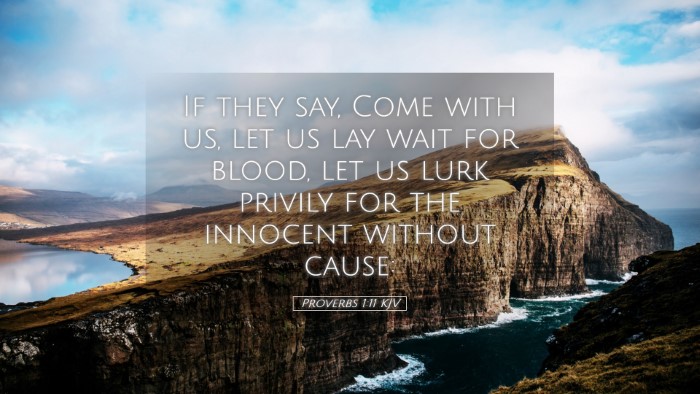Commentary on Proverbs 1:11
Verse Reference: Proverbs 1:11 - "If they say, Come with us, let us lay wait for blood, let us lurk privily for the innocent without cause."
Introduction
The Book of Proverbs, attributed mainly to King Solomon, serves as a guide to wisdom and moral living. Proverbs 1:11 provides a stern warning against the invitations of those who seek wrongdoing. This commentary will explore the implications of this verse for individuals and communities, integrating insights from several public domain commentaries.
Contextual Background
The opening chapters of Proverbs set the stage for an ongoing contrast between wisdom and folly. This verse is framed within a paternal admonition, emphasizing the need for discernment in heeding counsel.
Commentary Insights
Matthew Henry's Commentary
Matthew Henry highlights the danger of being tempted by those who seek to commit evil acts. He emphasizes the persuasive nature of allurements—how they can entice one to engage in violence or treachery. He suggests that the phrase "if they say" reflects the preemptive nature of these temptations; they aim to catch the unwary off guard.
Albert Barnes' Notes on the Bible
Barnes elaborates on the moral implications of "lay wait for blood." He stresses that the warning is not merely about physical bloodshed but symbolizes deeper spiritual corruption. He notes how those who engage in such conspiracies do so under the guise of camaraderie. The call to "come with us" represents a seduction into immoral behavior, indicating peer pressure's potency in leading one astray.
Adam Clarke's Commentary
Adam Clarke offers a more analytical perspective on the Hebrew terms used in this verse. He delves into the meaning of "lurk privily," arguing it connotes a sense of secrecy and deceit. Clarke points out how righteousness will often be opposed by those entrenched in wicked schemes. The solicitation to join in such activities should be viewed as a litmus test for one’s values and integrity.
Interpretative Reflections
The verse illustrates a critical choice: one must discern between the quiet call of wisdom and the clamor of folly. The wisdom literature, through this verse, prompts readers to consider the consequences of yielding to temptation.
The Nature of Temptation
- Deceptive Friends: Those who entice one to commit wrong are often false friends. True companionship promotes righteousness.
- Pursuit of Innocents: The targeting of innocence reflects a deep-seated moral decay within society. Such predatory behavior should provoke a response from the wise.
- Peer Influence: The social dynamics at play underline the urgent need for a robust moral foundation to withstand societal pressures.
Application for Today
In today’s context, the admonition in Proverbs 1:11 remains profoundly relevant. Pastors, students, theologians, and scholars must consider how peer pressure, media influence, and societal norms can lead individuals astray.
Guidance for Leaders
- Teaching Discernment: Church leaders should emphasize the importance of discernment beyond mere compliance with social norms.
- Fostering Accountability: Building communities where individuals can hold one another accountable helps combat the allure of temptation.
- Promoting Moral Courage: Encourage believers to speak against injustices and not to engage in morally questionable situations.
Conclusion
Proverbs 1:11 serves as a formidable caution against yielding to the invitations of the wicked. By synthesizing the insights from Matthew Henry, Albert Barnes, and Adam Clarke, we glean a multifaceted understanding of the nature of temptation, the significance of moral integrity, and the continual relevance of wisdom. In a world rife with distractions, this verse calls us to reflection, vigilance, and grace as we navigate the pathways of life.


